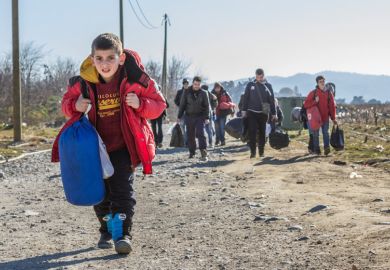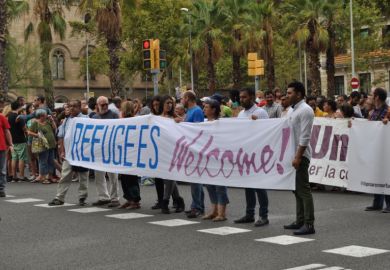How should universities respond to the Syrian refugee crisis?
Last year, King’s College London introduced two Sanctuary Scholarships a year for refugee students. Yet for Joanna Newman, vice-principal (international) who has now gone on to become the secretary general of the Association of Commonwealth Universities, this “didn’t seem like a sufficient response”. Looking at ways to do more, she consulted Michael Kerr, head of the department of Middle Eastern studies at King’s, and then met with Sir Derek Plumbly, a senior British diplomat who has served all over the Arab world.
When asked what King’s could do to help, Sir Derek's advice was: “Go to Lebanon, because there are lots of informal camps and refugees, but also people actually making a difference to refugee lives.”
Dr Newman, Professor Kerr and others, therefore, set off on fact-finding missions to Lebanon and Jordan. What they soon discovered, Professor Kerr said, was “a gap in the market in the NGO sector”.
In Lebanon for example, he explained, some Syrian refugees “attend mainstream schools under the remit of the Ministry of Education”. About the same number, particularly from poorer backgrounds, are “educated across the country outside the formal sector”. Few emerge with “the skills in English or IT they need to succeed in a university. What they lack is a pathway, including an element of socialisation through support and mentoring,” Professor Kerr said.
To take this forward, King’s formed Padileia (the Partnership for Digital Learning and Increased Access) with the American University of Beirut and Jordan’s Al al-Bayt University, online learning platform FutureLearn and Kiron Open Higher Education in Berlin. The last of these, now funded by Google, has created a portal aggregating online course content into curricula for refugees based in Germany. The partnership secured five years’ funding through the Spheir (Strategic Partnerships for Higher Education Innovation and Reform) initiative overseen by the British Council, Universities UK and Price Waterhouse Cooper on behalf of the UK’s Department for International Development.
King’s and its academic partners are now developing a foundation programme specifically aimed at bridging the gap between school and university identified by Professor Kerr. From September, this will be offered to 100 students a year identified by AUB and Al al-Bayt – on campus in Jordan and in mobile units in the Beka’a Valley in Lebanon – over a period of eight months. Since vast numbers of refugees put intense pressure on schools, about a third of the places are reserved for underprivileged Jordanians and Lebanese.
In the meantime, and probably around May, Padileia will launch an online platform for Syrian refugees. Initially, this will enable them to access all the courses Kiron makes available in Germany, where some already count as credits towards the first year of university degrees. King’s is now carrying out a needs assessment with a view to creating massive open online courses, voiced over in Arabic, in a much wider range of disciplines, potentially bringing in academics from right across the university. Students and staff will also be available to provide mentoring and support.
In the longer term, Professor Kerr said he was optimistic that such initiatives will do something to “promote acceptance of online provision, which is very low in the region. We hope this can lead to an eventual change in legislation, which should also help the disadvantaged populations of Jordan and Lebanon.”
There are two reasons why King’s decided to focus its energies on Jordan and Lebanon, although the project may eventually be extended into Turkey.
The first is simply that the largest numbers of Syrian refugees are there – official estimates put the numbers at 1.1 million in Lebanon and 1.4 million in Jordan. But because these countries are also safer than, for example, Iraqi Kurdistan, it is much more realistic to expect staff and students to spend time out there, in informal refugee camps or partner institutions. Last year, King’s launched its broader Sanctuary Programme so that, as Dr Newman put it, “when you come to King’s you are invited by your faculty or department to have something to do with the refugee issue”. Contributions can range from donating computers or taking part in a hackathon to going out to teach English in places of refuge.
By “providing a skills set, a learning experience and transferable employability skills”, Professor Kerr reflected, King's and its partners should help “enable a cohort of the refugees to act as agents of change in a future Syria. We want to prevent a lost generation.”
POSTSCRIPT:
Print headline: Building a better future for Syrian refugees
Register to continue
Why register?
- Registration is free and only takes a moment
- Once registered, you can read 3 articles a month
- Sign up for our newsletter
Subscribe
Or subscribe for unlimited access to:
- Unlimited access to news, views, insights & reviews
- Digital editions
- Digital access to THE’s university and college rankings analysis
Already registered or a current subscriber?








